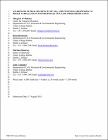| dc.contributor.author | O'Mahony, Margaret | en |
| dc.contributor.author | Broderick, Brian | en |
| dc.date.accessioned | 2019-08-02T12:44:19Z | |
| dc.date.available | 2019-08-02T12:44:19Z | |
| dc.date.created | Jan | en |
| dc.date.issued | 2019 | en |
| dc.date.submitted | 2019 | en |
| dc.identifier.citation | O'Mahony, M., Broderick, B., Hennessy, M. & Gallagher, J., Awareness of health impacts of NO2 and, potential responses to diesel vehicle bans and proposals to cease their production, Annual Meeting of the Transportation Research Board, Washington D.C., Jan, 2019, 12 | en |
| dc.identifier.other | Y | en |
| dc.identifier.uri | http://hdl.handle.net/2262/89152 | |
| dc.description | PUBLISHED | en |
| dc.description | Washington D.C. | en |
| dc.description.abstract | Evidence of associations between ambient concentrations of NO2 and a range of effects on health
has strengthened in recent years. On average, transport is responsible for 40% of NOx emissions
influencing ambient NO2 concentrations at the road side. Diesel engines emit a higher percentage
of NO2 and their recent popularity in the context of emissions is of some concern. Diesel engines
have been popular because of their higher efficiency and the lower costs of fuel but recent
proposed bans of diesel vehicles in major cities and proposals by some car manufacturers to stop
producing them is likely to influence changes in user behaviour. The research reports on the
findings of a survey of 730 individuals that 1) examined current general awareness of the impacts
of NO2 and air pollution on health 2) determined if geographical, transport and socio-economic
variables could be linked with self-reported health status of the participants in the context of
respiratory conditions, and 3) assessed the potential responses to diesel vehicle bans and proposals
to cease their production. Awareness of the impacts of NO2 on health was measurable and higher
than expected. Discriminant analysis found a number of transport and location predictor variables
could be linked to respiratory medical conditions although the strength of association was not
sufficient to give high performance in classification. Potential responses to cessation of diesel
vehicle production included hybrid and electric vehicle purchase with a significant number
suggesting they would keep their current diesel vehicle as long as it would keep going. | en |
| dc.format.extent | 12 | en |
| dc.language.iso | en | en |
| dc.rights | Y | en |
| dc.subject | Nitrogen dioxide | en |
| dc.subject | Health impacts | en |
| dc.subject | Diesel vehicle bans | en |
| dc.title | Awareness of health impacts of NO2 and, potential responses to diesel vehicle bans and proposals to cease their production | en |
| dc.title.alternative | Annual Meeting of the Transportation Research Board | en |
| dc.type | Conference Paper | en |
| dc.type.supercollection | scholarly_publications | en |
| dc.type.supercollection | refereed_publications | en |
| dc.identifier.peoplefinderurl | http://people.tcd.ie/mmmahony | en |
| dc.identifier.peoplefinderurl | http://people.tcd.ie/bbrodrck | en |
| dc.identifier.rssinternalid | 197992 | en |
| dc.rights.ecaccessrights | openAccess | |
| dc.subject.TCDTheme | Smart & Sustainable Planet | en |
| dc.subject.TCDTag | AIR QUALITY MONITORING | en |
| dc.subject.TCDTag | Environmental Impacts of Transport | en |
| dc.subject.TCDTag | Public health | en |
| dc.subject.TCDTag | Transport | en |
| dc.subject.darat_thematic | Environment and housing | en |
| dc.subject.darat_thematic | Health | en |
| dc.subject.darat_thematic | Transport | en |
| dc.status.accessible | N | en |




